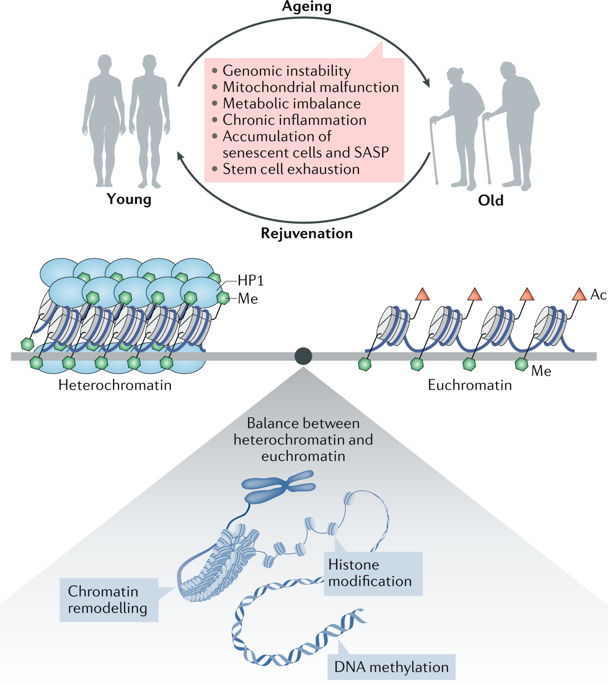当前位置:
X-MOL 学术
›
Nat. Rev. Mol. Cell Biol.
›
论文详情
Our official English website, www.x-mol.net, welcomes your
feedback! (Note: you will need to create a separate account there.)
The ageing epigenome and its rejuvenation.
Nature Reviews Molecular Cell Biology ( IF 81.3 ) Pub Date : 2020-02-04 , DOI: 10.1038/s41580-019-0204-5 Weiqi Zhang 1, 2, 3, 4 , Jing Qu 4, 5 , Guang-Hui Liu 1, 3, 4, 6 , Juan Carlos Izpisua Belmonte 7
Nature Reviews Molecular Cell Biology ( IF 81.3 ) Pub Date : 2020-02-04 , DOI: 10.1038/s41580-019-0204-5 Weiqi Zhang 1, 2, 3, 4 , Jing Qu 4, 5 , Guang-Hui Liu 1, 3, 4, 6 , Juan Carlos Izpisua Belmonte 7
Affiliation

|
Ageing is characterized by the functional decline of tissues and organs and the increased risk of ageing-associated disorders. Several 'rejuvenating' interventions have been proposed to delay ageing and the onset of age-associated decline and disease to extend healthspan and lifespan. These interventions include metabolic manipulation, partial reprogramming, heterochronic parabiosis, pharmaceutical administration and senescent cell ablation. As the ageing process is associated with altered epigenetic mechanisms of gene regulation, such as DNA methylation, histone modification and chromatin remodelling, and non-coding RNAs, the manipulation of these mechanisms is central to the effectiveness of age-delaying interventions. This Review discusses the epigenetic changes that occur during ageing and the rapidly increasing knowledge of how these epigenetic mechanisms have an effect on healthspan and lifespan extension, and outlines questions to guide future research on interventions to rejuvenate the epigenome and delay ageing processes.
中文翻译:

表观基因组的衰老及其复兴。
衰老的特征是组织和器官的功能下降以及衰老相关疾病的风险增加。已经提出了几种“振兴”干预措施,以延缓衰老,与年龄有关的衰落和疾病的发作,以延长健康寿命和寿命。这些干预措施包括代谢操纵,部分重编程,异时性共生,药物管理和衰老细胞消融。由于衰老过程与基因调控的表观遗传机制改变有关,例如DNA甲基化,组蛋白修饰和染色质重塑以及非编码RNA,因此这些机制的操纵对于延缓年龄干预的有效性至关重要。
更新日期:2020-02-04
中文翻译:

表观基因组的衰老及其复兴。
衰老的特征是组织和器官的功能下降以及衰老相关疾病的风险增加。已经提出了几种“振兴”干预措施,以延缓衰老,与年龄有关的衰落和疾病的发作,以延长健康寿命和寿命。这些干预措施包括代谢操纵,部分重编程,异时性共生,药物管理和衰老细胞消融。由于衰老过程与基因调控的表观遗传机制改变有关,例如DNA甲基化,组蛋白修饰和染色质重塑以及非编码RNA,因此这些机制的操纵对于延缓年龄干预的有效性至关重要。




















































 京公网安备 11010802027423号
京公网安备 11010802027423号